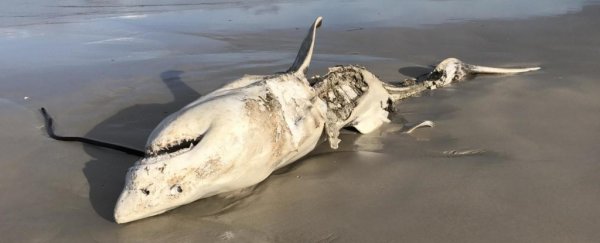Just when you think orcas couldn't possible be any more awesome, they get even better. A study in 2019 showed these whales are really good at scaring off the most feared beast in the sea. Yep. Orcas have toppled the great white shark off their 'apex predator' throne.
A team of marine scientists found that great white sharks (Carcharodon carcharias) will make themselves extremely scarce whenever they detect the presence of orcas (Orcinus orca).
"When confronted by orcas, white sharks will immediately vacate their preferred hunting ground and will not return for up to a year, even though the orcas are only passing through," said marine ecologist Salvador Jorgensen of Monterey Bay Aquarium.
The team collected data from two sources: the comings and goings of 165 great white sharks GPS tagged between 2006 and 2013; and 27 years of population data of orcas, sharks and seals collected by Point Blue Conservation Science at Southeast Farallon Island off the coast of San Francisco.
The team also documented four encounters between great white sharks and orcas in the Greater Farallones National Marine Sanctuary, which they could then analyse against the other data.
The data revealed that whenever orcas showed up in the region - as in, every single time - the sharks made a swift exit, stage left, and stayed away until the next season. They would choof off within minutes, even when the orcas only hung around for less than an hour.
And there was a surprising beneficiary: the elephant seals (Mirounga angustirostrous) that inhabit the coastline and are preyed upon by the great white sharks.
"On average we document around 40 elephant seal predation events by white sharks at Southeast Farallon Island each season," said marine biologist Scot Anderson of the Monterey Bay Aquarium. "After orcas show up, we don't see a single shark and there are no more kills."
Transient orcas have also been known to eat the elephant seals, but these visiting whales only show up infrequently. Resident killer whales feed on fish.
The sharks didn't always go far. Sometimes they would only move a safe distance along the coast, where they were close to different elephant seal colonies. Sometimes, though, they would head out to the middle of the Pacific Ocean, the region dubbed the White Shark Café.
These are not tiny sharks, either. Some of them measure over 5.5 metres (18 feet) from nose to tail, and are probably pretty used to getting their own way wherever they go. But 5.5 metres is on the small side for orcas, which can prey on whales much larger than that, so they're unlikely to be pushed around easily.
In addition, orcas have been observed preying on great white sharks around the world, including near the Farallon Islands. It's still a little unclear why, but the orca-killed sharks that wash ashore (one is pictured at the top of the page) are missing their livers - their delicious, oil-rich, full-of- vitamins livers.
Whether the sharks are instinctively avoiding the predators that can so handily eviscerate them, however, or whether transients in the past have bullied the sharks away from the elephant seal food source is still an unknown.
"I think this demonstrates how food chains are not always linear," Jorgensen said.
"So-called lateral interactions between top predators are fairly well known on land but are much harder to document in the ocean. And because this one happens so infrequently, it may take us a while longer to fully understand the dynamics."
The research was published in the journal Scientific Reports.
A version of this article was first published in April 2019.
